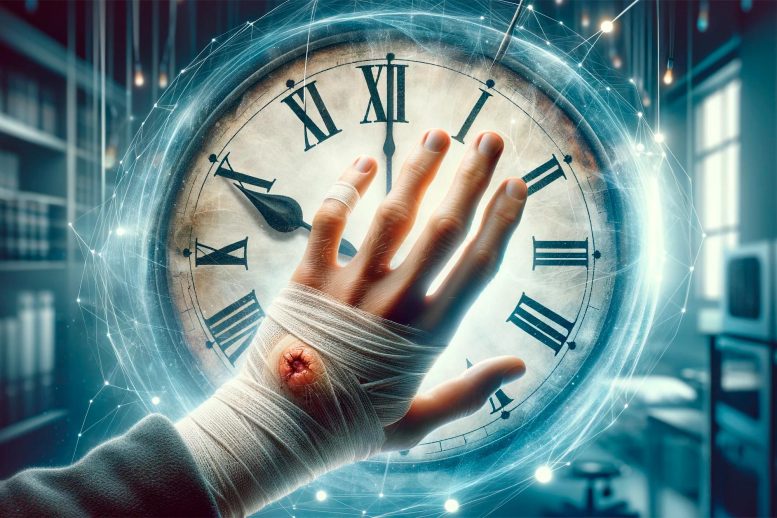
Harvard psychologists show that the way we perceive time affects the speed of physical wound healing. Using experiments where participants experienced time at different rates, the study found that wounds healed faster when more time was perceived to have passed, challenging traditional views on the psychological influences on physical health. Credit: SciTechDaily.com
A Harvard study demonstrates that perceived time can accelerate or slow down physical healing, suggesting a strong mind-body connection in health.
Perceived time has a significant impact on the actual time it takes to heal physical wounds, according to new research by Harvard psychologists Peter Aungle and Ellen Langer.
Their study, published last month in Nature Scientific Reports, challenges conventional beliefs about psychological influences on physical health. The findings suggest a broader range of psychological influences than is currently appreciated.
Study Methodology and Surprising Findings
To complete their study, the authors used a standardized procedure to mildly wound volunteer subjects. Perceived time was then manipulated in the lab, with each study participant completing three experimental conditions: Slow Time (0.5x real-time), Normal Time (1x real-time), and Fast Time (2x real-time).
Wounds were documented as healing faster when participants believed more time had passed. Likewise, the healing process proved slower when less time was perceived to have gone by. Actual time elapsed was the same under all three conditions.
Implications and Future Research
Further research is underway to better understand the underlying mechanisms and broader implications of these findings. Meanwhile, the study makes a compelling case for more fully incorporating the idea of mind-body “unity” into subsequent inquiries on mind-body health effects. In particular, researchers are urged to consider a broader range of psychological influences on physical health.
Psychological influences on physical health are typically understood in terms of influences on emotion (e.g., stress, inflammation, and immune function) and behavior (e.g., beliefs that promote healthy actions). This research suggests abstract beliefs about how our bodies work also directly shape physical health.
Reference: “Physical healing as a function of perceived time” by Peter Aungle, and Ellen Langer, 17 December 2023, Scientific Reports.
DOI: 10.1038/s41598-023-50009-3
>>> Read full article>>>
Copyright for syndicated content belongs to the linked Source : SciTechDaily – https://scitechdaily.com/harvards-startling-discovery-perceived-time-affects-healing-rate/